Episode 6:
Silent Struggles: The Implications of Stigma on Mental Health
S01 - Episode 6
July 13, 2024
34 mins & 08 secs
Speakers
Chris McLaughlin
Soren Peterson
About
In Episode 6, Chris and Soren work to break down the stigma that exists in our world around mental health and wellness. Join Soren and Chris as they explore how each of their generations approach conversations about mental health and wellness. We’ll discuss the role that bias can play in how we approach mental health and the importance of reflecting on this bias every day. We must recognize that we’re all a work in progress! Let’s “make it weird” and check in with one another about our mental health!
*Please note that this episode contains sensitive behavioral health topics such as suicide and substance use. If you are experiencing a behavioral health crisis, please contact the 988 Suicide & Crisis Lifeline by calling 988 or visiting www.988lifeline.org.
**This podcast is for information and entertainment purposes only and should not be considered health advice. This podcast is not intended to replace professional medical advice.
Transcript
Chris: Welcome back, Soren. Ah, yes, back in the studio. Back in the studio.
This has been a really amazing experience for me, hanging out with you like this.
Soren: I think that it’s been so rewarding for me, because I love to talk. I love to chat about everything. And I don’t really have a fantastic outlet for some of these deeper subjects.
So I think that this is a really cathartic experience for the both of us.
Chris: Yeah, that’s a great word for it. So last week, we were talking about queer media. And when we were wrapping up the conversation, you made a statement about you and maybe some of your friends feeling like this idea of queer representation in the media is just the way it is now.
Like it’s just, you don’t have as strong of a feeling about it that I have, having missed that representation in my childhood and formative years. For you and your peer group, this is just the way it is. And so these queer identities are just woven into these stories lines, and you don’t even blink an eye.
And it got me thinking about the topic we wanted to bring up today, which is around stigma and mental health. And when we were prepping for this conversation, you made a comment that was also really interesting to me. And it reminded me of what we talked about last week, where you said, for you and your folks your age, you don’t necessarily feel like there is a negative stigma, or as much of a negative stigma around mental health.
Because for you and your peer group, this is just a thing. Yeah, yeah.
Soren: Can you talk a little bit more about that? Well, obviously people frown upon the negative behaviors which mental illness evokes, but the discussion of it is so normalized. In my peer group at least, open, honest conversations about our mental health and our mental health journey is such a normal and common occurrence.
And I think we have no, I guess, what’s the word I’m trying to come up with? Resonance?
Chris: Maybe.
Soren: Yeah, yeah. We don’t feel cautious around the subject. We approach it bluntly, I would say.
And it’s not seen as something that you have to tiptoe around or try to augment the way that you’re speaking. It’s very normalized.
Chris: So for you and your friends, it’s not abnormal to both say, how you doing? I’m noticing you’re a little down, or you haven’t been quite yourself lately. Or to say, you know what?
I’m not feeling great.
Soren: Yeah, yeah.
Chris: That’s a very normal conversation to have.
Soren: would say maybe this is unique to my friend group, but I feel like it’s fairly pervasive. Discussions of mental health and general standing emotionally is so normal and common.
Chris: Yeah.
Soren: And my friend group, a lot of us have had fairly extreme histories with mental illness. And I think the way that we approach it is so different to the way that it used to be approached. And maybe you could share a little bit about your understanding of what mental health and what mental illness was in your youth.
Chris: Yeah. The exact opposite of how you’re describing it, if I can be very blunt. I don’t have any memory of ever saying to one of my childhood…
When I say childhood, I’m thinking school age, kindergarten through high school. I can’t think of one time where I have said, I’m feeling really down or depressed. I think stressed is probably the word that my generation used most to reflect anything not baseline.
Stressed.
Soren: Yeah, yeah.
Chris: And stressed might mean I’m anxious. Stressed might mean I’m down. Stressed might mean I’m frustrated or angry.
But that was just sort of like, I’m stressed. Nor do I remember, despite what I do for a living, I don’t remember ever checking in with other friends to say, this is out of character for you. How are you?
What’s going on in your life?
Soren: Well, I think the reason it’s been so normalized in my age group is just the raw prevalence of extreme emotional experiences that we’ve all had. There is a mental health crisis in our youth. And as a result of that, we can have far more open and honest dialogues because the vast majority of us have, at least to some extent, dealt with similar issues.
Chris: Yeah, so it’s so normalized.
Soren: Yeah, yeah.
Chris: And as a behavioral health provider and somebody who speaks on these topics often, I know that this behavioral crisis is unlike anything we’ve seen, both here in our state of Maine, but also across our country. Wait lists, demand for services, and workforce shortages are just like, we’re in the eye, maybe. We’re approaching the eye of this perfect storm.
That, as a provider, terrifies me. Yet, when I talk to you about your perception of a lack of stigma, it actually gives me a little bit of hope. Because in my world, stigma is one of the barriers to being able to talk openly about wellness.
Stigma, whether we’re afraid to appear weak, whether we’re afraid to be acting in a way that doesn’t fit with our gender role or our assigned gender role. As growing up male, we boys don’t talk about feelings.
Soren: Yeah, yeah.
Chris: And as we’ve talked about in a previous podcast, I was so deeply in the closet that I never would consider doing anything that publicly or interpersonally threw my gender role into question.
Soren: Yeah, yeah.
Chris: So being stoic, even though I felt things very deeply, very deeply, I wouldn’t ever do anything to be able to say, I’m not well, I’m not doing okay. Yeah, yeah. I worry would have put a bigger target on my back.
Now, whether it would have in real life or not, I’m not sure, but that’s what it felt like. And that is a part of what stigma looks like. Yeah, yeah.
To me.
Soren: Well, I do see that male stoicism in a lot of my friends because I do have several male friends, cisgender male friends that do identify with that gender role strongly and identify with being stoic. But yet at the same time, they’re struggling with deep emotional crises. And I think I’ve intentionally spent a lot of time attempting to break down the idea of stoicism and try to have blunt conversations, which I don’t know if it’s me introducing the topic or them genuinely desiring to have real conversations.
Maybe both. Yeah, yeah. I feel like stoicism serves as such a barrier to attempting to actually be productive mentally.
Chris: Yeah. Oh my gosh. Yeah, absolute block for sure.
Yeah, you know, when I, I feel like professionally, I see stigma being such a hurdle for folks my age and maybe the in between generations from you and I like so folks who are currently in their, their early or mid 20s. Who are maybe experiencing things like parenthood, or life after college or life after grad school or life after trade school, where pressure is also quite high just in a very different way. And I think, here’s a, here’s a wonder I have and let me know if this jives for folks in your age bracket.
The experience of the pandemic, where there was a concerted effort to get this PSA type message out there of check in with your friends. When we were in full lockdown mode, where social interaction was essentially cut off. As a behavioral health provider, I know that what I both preached and practiced was check in, make it weird.
Ask folks, especially your, your male friends, ask them how they’re doing, and portray yourself as being somebody who is safe and non judgmental to acknowledge, I’m not well because to your point, what we knew through the pandemic was the vast majority of us at one time or another, were not well during that period of time.
Soren: Well, okay. I don’t think that necessarily like the PSA during the pandemic, go check in with your friends resulted in this. However, I think the pandemic super indirectly impacted that, like during the pandemic, a lot of my friends, and myself included, were extremely emotionally isolated.
And that created us like extreme negative emotional experiences for us. And like a lot of with a lot of my friends, it was like life or death situation, the pandemic. Yeah, quite literally, quite literally.
Chris: Yeah.
Soren: For me, definitely. So now coming off of that, we have learned the necessity of communication, rather than learning that by being told to do so. We through our experience, now understand the gravity of the situation, and understand that we need to be a support system for each other.
Right.
Chris: So let me ask you this. Was this idea of being more open about your wellness or your absence of wellness for you and your friends, did that exist prior to March of 2020? Or did the experience of March 2020 help move you and your peer group into this enhanced comfort of just acknowledging, validating and talking through tough times?
Soren: Well, okay. I think that my mother and my father have ingrained in me really healthy, like emotional and interpersonal habits with communication about emotions. And I think like those skills that they’ve given me have been so beneficial.
So I did have an idea of that. And I understood to some extent, the importance of communication about emotion before that time. Yeah.
However, like, it wasn’t really seen as like a necessity before then. And I don’t think I had like the depth of relationships in March of 2020 that I do right now, nor do I have any of the same friends, right? Like in March of 2020, I was still a small child.
I was, I think, 12.
Chris: Yeah, good point.
Soren: Good point. Yeah. So like, it wasn’t, I didn’t have the depth of emotion that I have now.
And I was a scared little child. Yeah. Yeah.
But I do think that like, communication about emotions has been something that’s been emphasized throughout my entire youth. But I don’t think that that’s the case for really any of my friends, actually.
Chris: Yeah, and I think about some of the young people that I know and work, you know, know interpersonally and know professionally. I would suggest that maybe for you and your peer group, you have normalized this checking in, perhaps to a higher degree than what other similar age kids are doing. And I also wonder, because, you know, you have shared parts of your own journey with mental illness, and some of the situations that you and friends have been in, so that the commonality of some of your lived experiences with mental health and wellness maybe has opened up the door to be more vulnerable and transparent.
Yeah, yeah. I still know a significant number of young people, especially young boys, young males, who would rather step on a nail. Yeah, yeah.
Than say, I’m struggling right now.
Soren: Well, that’s such a conflict that like, so many people face, like, it’s very difficult. Like, and a lot of my friends feel guilty when they’re talking about like issues that they’re having, because I think that they’re saddling someone else with their burden. They feel like…
Chris: But is the communication so open that as the receiver of their struggle, you are imagining there’s a pathway to saying, you know what, I don’t know that I’m in a space to hear or adequately support you with what you’re going through right now.
Soren: Yeah, yeah.
Chris: And kind of put up that no trauma dumping allowed right now.
Soren: Um, I like, I don’t think that that’s been, at least in my group, I think that we’re all very able to, to some extent, to have those boundaries, just naturally. Like it doesn’t have to be something that’s set forth. We can all just like vibe out the comfortability level of others.
And you, I think can, through like understanding the conversation and how it’s flowing and knowing their peers, make those boundaries sort of non-verbally. Uh, and I think that’s what we do. Yeah.
Um, but I, I know myself, whenever I get like someone shares an emotional experience with me, I feel relieved. I, I don’t feel emotionally burdened by what they have to say because I feel like, Hey, I’m helping someone. And that makes me feel fantastic.
Like, I think it actually fills my bucket because I am super interested in what my friends have going on. I would love to hear their life experience. And by listening to that, I feel like I’ve helped them.
And then I leave feeling fulfilled, feeling more than no and not worrying about them. Um, and I feel like rewarding experience for me. Yeah.
And you are such an empathic person as well. I try to be, you are, you absolutely are. You know, it’s interesting.
Like last week we were talking about queer media and my experience growing up in the absence of healthy, inclusive, um, role models or representation in the media. I feel like mental health for me is the same way, you know, like the stigma or the stereotype of mental illness back in my childhood looked like the homeless person talking to themselves on the streets. It looked like a more violent on, um, not, uh, not what’s the word I’m looking for.
Um, uncontrollable.
Chris: Yeah.
Soren: Unpredictable, unpredictable. Like they could snap at any minute and, um, therefore acknowledging these universal emotions of depression, sadness, you know, all the shades of depression, all the shades of the anxiety colors, um, might mean that people are going to see me like that. So I better not talk about it.
Well, I think up until very recently, you mentioned this vision of mental illness as like in a very extreme situations with like homeless people, right? That was the only mental illness that was made visible because people were so afraid to share their experiences, right? Uh, so then that was the only thing that we saw of mental illness.
So then when someone else attempted to come forward about their experience, we would associate them with that. Um, so, and then more people would be like, oh, now I can’t share my experience. And I think it’s a super recent phenomenon that we’re seeing mental illness not as something to be feared or like necessarily an objective negative, but rather a universal experience that one can grow from that can be positive in the long run.
And, uh, that needs to be addressed in a, like not professional, but a serious way. Right. And actually this sort of pivoting, but I see like a lot of youth addressing their mental health crises.
And I do this myself, uh, to cope, um, through like jokes and it’s seen as something very jovial. And I think that is important to some extent, but also I think it can, um, be negative because it doesn’t address the gravity of the situation. And like in a lot of these situations, it’s people’s lives in the balance.
Like it needs to be a serious conversation. It can’t be like off the cuff. I couldn’t agree more.
Yeah. Yeah. And this idea of stigma, which as you’ve been talking about is connected to stereotype, which is connected to prejudice, which is connected to unconscious implicit bias runs so deep as well that for folks with more years on this planet, there’s a lot more for us to have to unpack.
Let me give you a fairly recent example. So I see myself very humbly as a pretty decent social worker. Yeah.
I think I’m pretty good at what I do. I think you’re fantastic. Thanks.
And let me tell you this story. So several weeks ago, I was in Portland, which is a probably Maine’s largest city, just a couple hours South of where we are now. And I was meeting friends and they gave me an address for a, um, uh, parking garage area.
And I was going to meet them there. We were going to go to dinner and see a show. So I got there first and it was an outdoor parking area, very unlike what we have here in our neck of Maine.
Um, and so I got there first and so I parked the car, got out and paid for the parking. Coming back into my car, I noticed a gentleman kind of emerge from the bushes from around a building. And instantly I recognized two things.
I recognized that this individual looked the part of somebody who’s, um, absence of housing and either struggling with an, with an acute mental health issue or was under the influence of something. Yeah. So as I walked to my car, monitoring where he was the whole time, being the really good social worker that I think I am, what do you think I did the minute I got in my car?
Um, okay. What I, what I think you did, I think is different from, I think you locked your car and drove away. I didn’t drive away.
I locked my car door and reclined my seat to be under the view. Now here’s what, and I didn’t give a second thought of what doing that. Yeah.
I, it was three things happening almost instant, instantaneously locking the door, reclining my seat and pulling up my phone to get either my friends that I was meeting or 911 on speed dial. It wasn’t for a couple seconds that my intellectual social worker brain kicked in. And I said to myself, Chris, you know, that statistically speaking, homeless individuals are more likely to be the victims of violence than the perpetrators.
And individuals with mental health issues, behavioral health issues are more likely to be the victims of violence and the perpetrators. Like I know that the data supports that yet this idea of mental illness is dangerous and unpredictable. And I was at risk was so pervasive for the 50 years I’ve been on this planet that without even thinking about it, I locked my door, hid from view and got my phone ready.
Well, we’ve been trained to see that as like, that is danger. That’s not a person that’s like a threat. Yeah.
That’s a walking threat. Yep. Uh, right.
And I think actually that ties into like a modern, the man versus the bear, like you’re so much more likely, assuming it’s just like a randomly selected man to have like a bear mutilate you. Yeah. But like, we are, women are trained to be afraid of like liabilities because it can be dangerous.
Yeah. But also it’s dehumanizing to some extent. And it’s like, not an irrational fear, not an irrational fear, but like a not based in statistics fear.
Chris: That’s right.
Soren: It’s so ingrained. I mean, I think what you’re speaking about is a social media trend going around right now on, um, would you rather face a bear in the woods or a man you don’t know in the woods? And most women when asked would choose the bear over the man because this idea of violence and threats and personal safety, it runs deep.
And I don’t pretend to know from the perspective of a woman. I don’t pretend to know. I mean, I, my privilege as you and I often talk about, um, identifying as a man being born a man.
I, uh, don’t know what that feels like yet. There I was in that parking lot in Portland shrinking from view and locking my door when I perceived a threat. Um, but it’s, it’s this, the stereotype, the stigma runs so deep.
And I loved how you said we’ve been trained to believe this. Everything that we, that I grew up with in the media and, um, even walking around as a, as an adolescent in the streets of my hometown, I was trained to perceive danger in something I didn’t understand. Well, like, which is, I think, evolutionarily viable.
If you don’t know what’s happening, leave immediately. Right. Right.
Um, and like my parents have trained me to do that. That’s right. In order to avoid risk, don’t be around anything that you don’t know about.
Chris: Yeah.
Soren: Which makes sense, but also can create a ton of problems and like societal rifts. Yeah. And that like fear of the unknown has resulted in the degree of stigma that, uh, we have around mental illness.
Yeah. Yeah. I agree.
I agree. So I’m curious, Soren, with you and your friends, do you have any, for folks that might be watching or listening who are thinking to themselves, well, this is easier said than done. Like, how am I supposed to even start normalizing talking about health and wellness?
Do you have any strategies that have worked really well for your friend groups on how you approach the checking in or the being checked in with? Yeah. So with a lot of my male friends, I feel like they are only comfortable having like deep conversations like that and addressing that issue in like a very specific context.
Like for our friend group, it’s around the fire. Yeah. Right.
You need, which I think men have been doing for decades.
Chris: Yeah. Thousands of years.
Soren: Yeah. Go to the man cave. That’s where you talk about these things.
Uh, and I think it’s been like a general progression of trying a little, uh, trying to start that dialogue, uh, just naturally in contexts that are very low key, very comfortable. And then eventually you can injure, uh, introduce that topic in, um, less like tailored situations. And like, you can just check in with people, um, through texting or like actually, uh, a really great example that I think, uh, was fantastic was, uh, one of my friend’s girlfriend, not one of his girlfriends, my friend’s girlfriend.
Um, like I think a month ago or so was talking to me and very concerned for my friend. So I just started a random conversation. It wasn’t about anything to do with mental illness.
And then like, um, my friends just started talking about how their day was and what they’ve been doing. And then they talked about like some of the stress with their homework. And then I, that’s like an opportunity to seize on.
You can say, Oh, like what has your emotional experience been of like, and then you can share like your experience, which I think like showing vulnerability yourself is so important to attempt to get somebody to open up. It needs to be a mutual, mutual dialogue. You’re not pulling information out of them.
You’re sharing information with the group. Yeah. I think it’s, um, our old pal, Mr. Rogers, who talks about how anything mentionable is manageable and the ability to put something in words as scary as it initially might be. If you can talk about it, you can manage it better. You can deal with it. Yeah.
So what I hear you saying is you’re building new habits, creating new muscles to then hopefully start working out and let muscle memory eventually take over. You’re normalizing and you’re modeling that I can talk about this stuff with you. I trust you.
I know you’re not judging me. I know that you’re not gonna, um, break my confidence and tell other people what I’ve told you. So you’re modeling that you are safe person and you are just creating space to let that person come to you like you’re opening the door and then walking away from the door and allowing them to walk through when they’re ready.
I totally agree. For me, it’s just about expanding the safe space, creating a like regular dialogue rather than it being like conversations in isolated events. You need to see emotions and progression of them holistically and you need to address them holistically.
That is so important because if we’re only checking in with our with our loved ones and friends during the difficult times, then we might be sending the unintended message that I only care when you’re at your worst. I think that’s I that’s really like profound. And we, I think, also have to normalize in some, I have some memories as well where if I was too excited about something, I’m also crossing that gender role that I’m supposed to be what stoic.
And so the extremes on either end of stoicism, if I’m too low or too high, I’ve I’ve I’ve veered out of my lane as what the male is supposed to be like. Well, I am super thankful to my the environment that my parents have provided because I am a very expressive, dare I say, extreme person. And when I’m having an emotional experience, it’s a lot.
Yeah. And I am very excitable and vibrant and joyous. Yeah.
And I think if I was raised in an environment in which the traditional male gender role was emphasized heavily, yeah, I would be to some extent broken. Right? Because I would be crashing against the walls of a box that I simply can’t fit into.
Chris: Yeah.
Soren: And I’m like, breaking my bones on each hit.
Chris: Yeah. Right. Yeah.
I think so.
Soren: That’s a powerful feel like, pent up. Yeah, right. That’s a powerful image.
Well, and here’s what I also want to say is that, you are providing some really valuable insight into how young people can normalize and check in and make this make create safe spaces to talk about this. And it’s also important to help coach families. Yeah.
To also create that similar space.
Chris: Yeah.
Soren: Any emotion my child is experiencing is valid. Yeah, it’s okay. We can talk about it.
And I think so much of our language, whether we’re even aware of it or not, calm down. You’re too, you know, you’re, you’re too, you know, oh, that’s you’re a lot right now. Like I think about those kinds of comments that I’ve heard families or parents, caregivers say about kids like they’re a lot.
Yeah. And I want to be like, what does that mean? Well, they feel everything.
And I’m like, great. Like that’s a strength. I see that as a powerful strength.
I see that as what you, what we know is that a young person’s ability to express and identify feeling is linked to resiliency. Yeah. Linked to good health outcomes that if I know what it is I’m feeling, and I have some insight into what it is and why it is, and I can talk about it, then when times are a little tougher, that skillset can manifest.
It just, it needs to be like a constant dialogue to de-stigmatize. You have to normalize.
Chris: Yeah.
Soren: Oh, that’s our tagline for this episode. Yeah, absolutely. Yeah, absolutely.
Um, but I, I just, I’m so excited for the future with looking at the conversations that like, I’m seeing happen around me. Obviously we’re all afraid and there is a mental health crisis, but I think it’s really important to remember that with each low point, there is an up, right? And through these negative experiences and through this like collective trauma that the mental health crisis is putting our youth through, um, we can yield emotional maturity.
We can yield better coping strategies as a generation. Uh, and we can inform like older people, uh, to create a more like cohesive social unit that supports each other. Yeah.
Well, what we’ve talked about in this podcast before is this idea that our best days are still ahead.
Chris: Yeah.
Soren: That there’s always better days ahead that we are all works in progress. And, um, the other piece that I hear you talking about, which I think is just really, uh, kind of magical is shared experiences build community and community builds resiliency. And so the more we can connect with one another on the shared universal experiences, where it’s okay to talk about the rough stuff as much as the positive stuff, we can build community in community.
There is strength and in strength, there’s, uh, resilience to those challenges the next time they come around. Yeah. Yeah.
We’re all in this together. Yeah. Well, Sorin, this has been another fascinating conversation with you.
I’m really excited to see where, um, the second half of our season goes. Well, I think that this has been, uh, fantabulous episode six out. I think so.
Yeah, I think episode six. So as we launch into the second half of season one of the inspired insights podcast, we want to thank you so much for sticking with us and listening to us.
Chris: I’m Chris McLaughlin.
Soren: I’m Sorin Peterson.
Chris: We’ll see you next time. Have a marvelous day.
—
Inspired Insights Podcast has been brought to you by Inspired Consulting Group, LLC
Show More
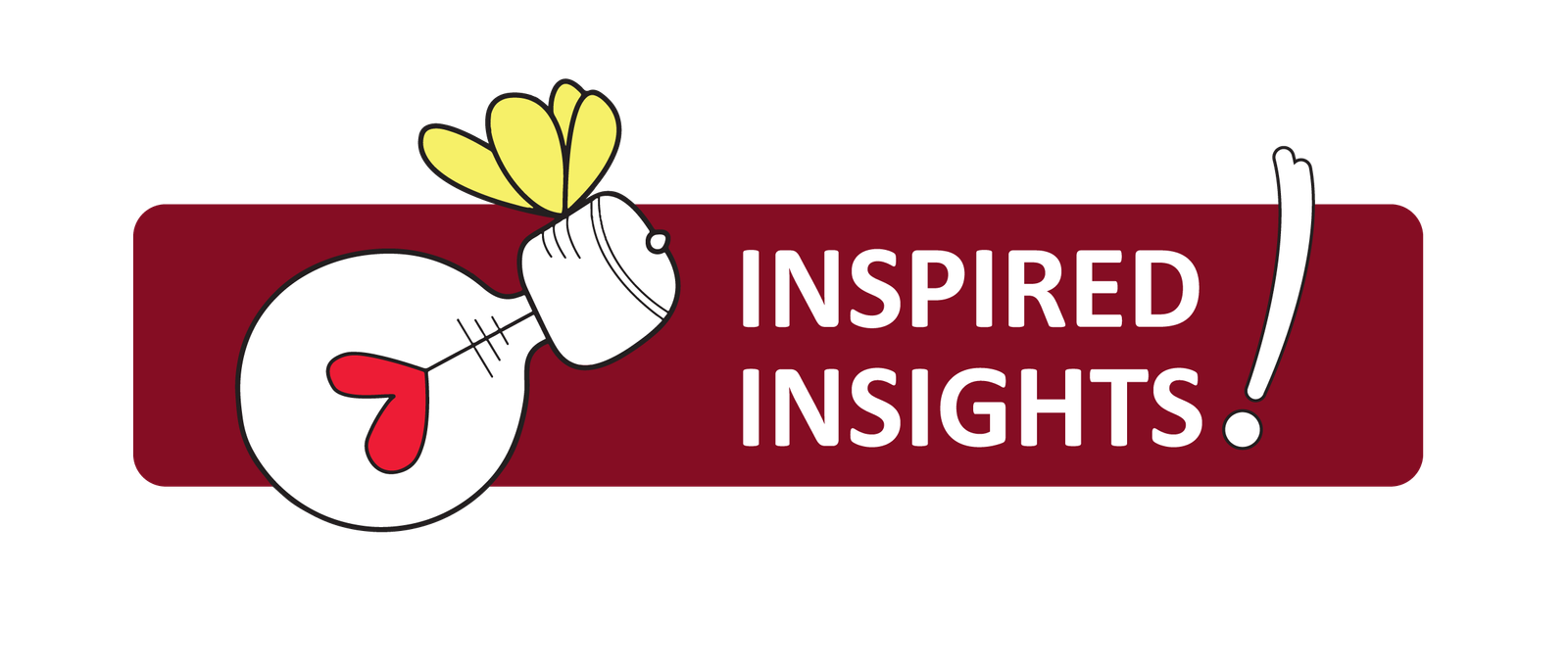
All Episodes

S3E9: College Bound: Transitions to Your Next Era
Soren and Chris sit down with two student life experts, Angela and Andi, to explore the powerful transition from high school to college—and how it reshapes community, mental health, identity, and daily life.
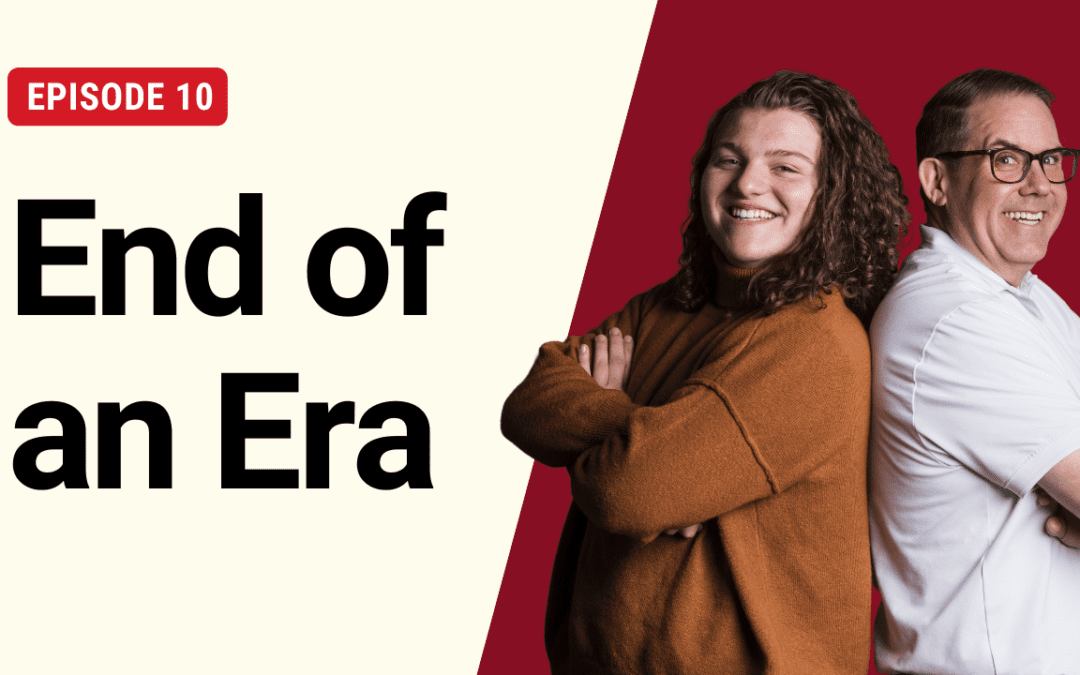
S3E10: End of an Era
Chris and Soren sit down in front of a studio audience filled with family, friends, and past guests to reflect on three seasons and 30 powerful episodes of storytelling, vulnerability, and intergenerational insight.
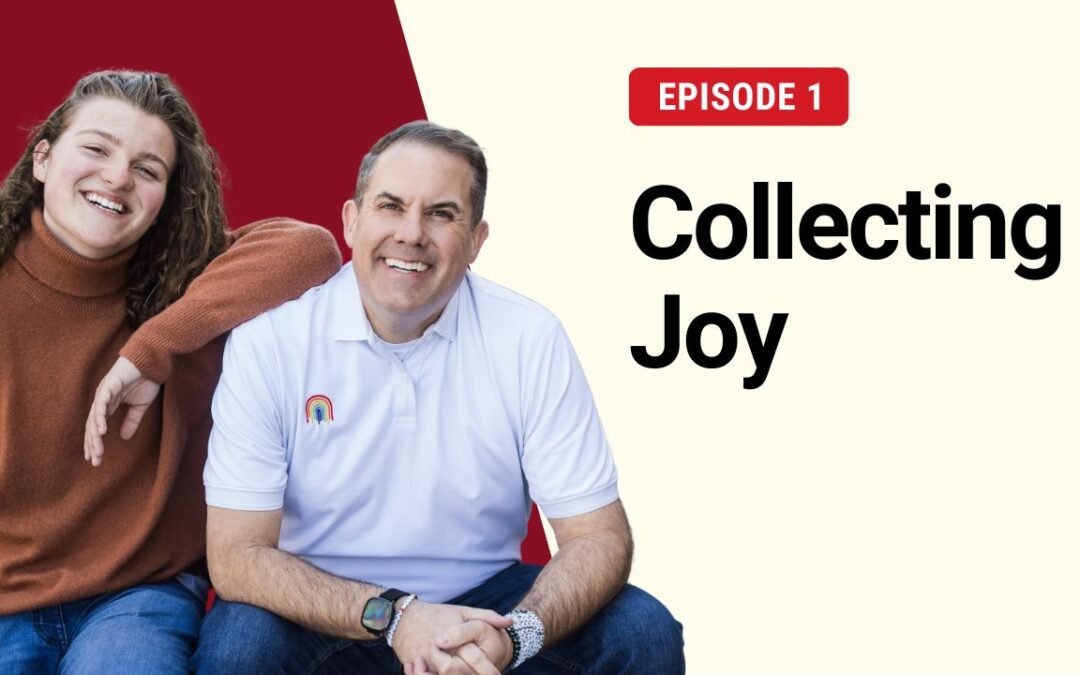
S2E1: Collecting Joy
The start of Season 2 is here! In our premiere episode, Chris and Soren explore the pursuit of happiness through the intentional collection of joy.
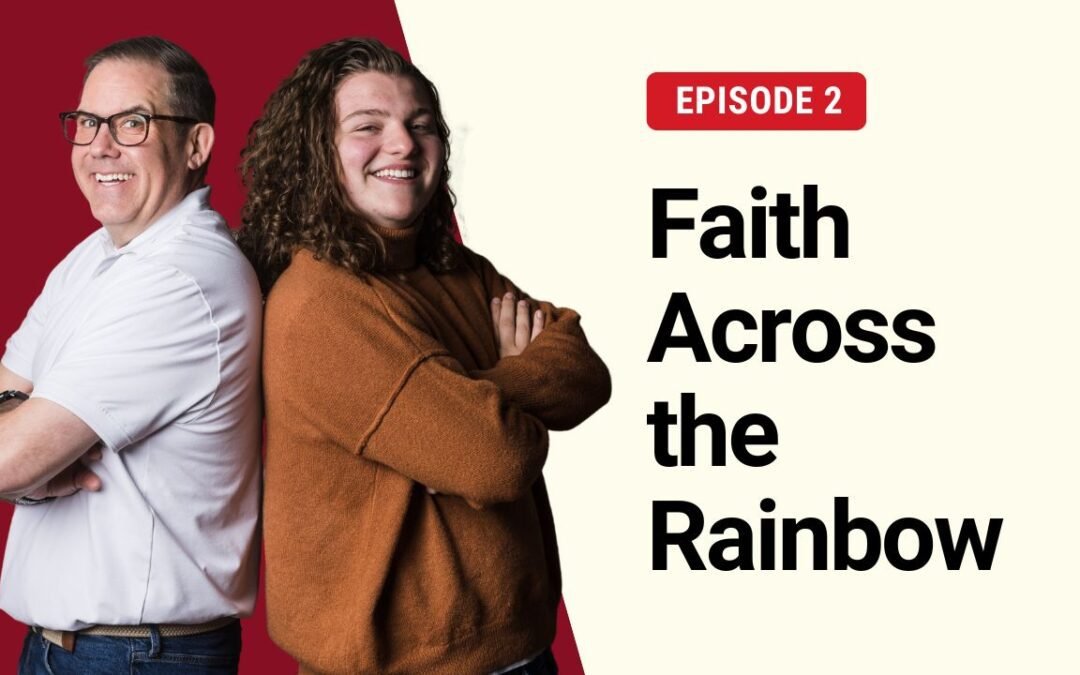
S2E2: Faith Across the Rainbow
Join our guest, chaplain and clinician, Greg Bridges-Music, as he talks with Chris and Soren about navigating the intricate relationship between spirituality and LGBTQ+ identities.

S2E3: Sequins and Smiles
Dive into the vibrant world of drag as Maine’s local drag performer, Dominick Varney, shares personal stories and insights on embodying Queer Joy through the art of drag.
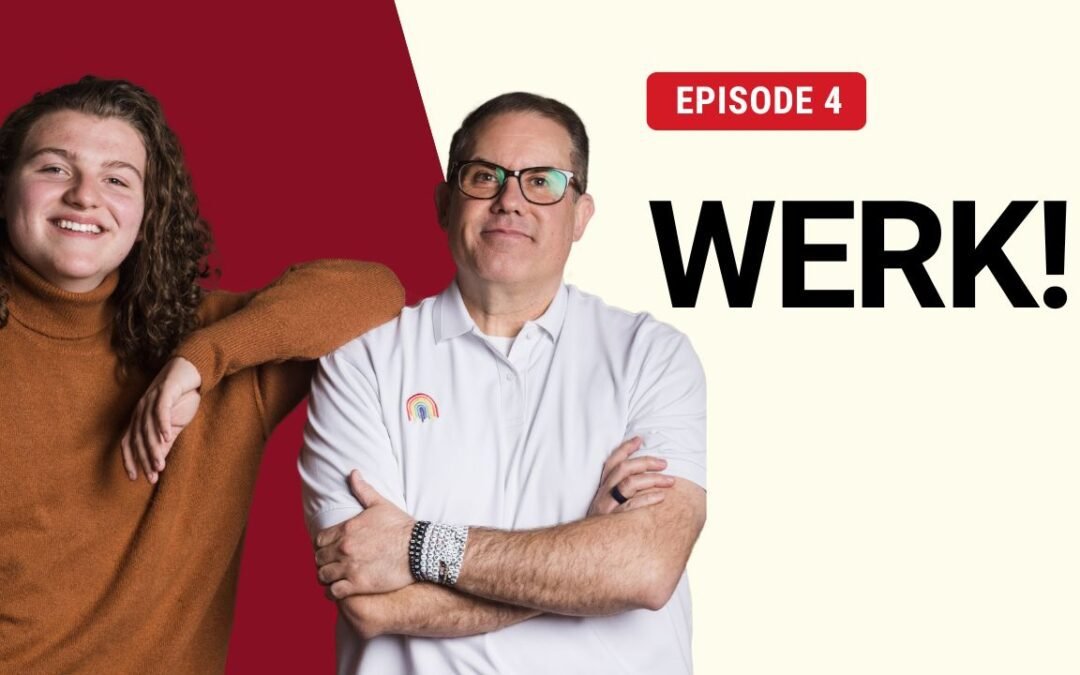
S2E4: WERK!
This discussion highlights how attitudes towards careers, workplace culture, and work-life balance have shifted over time.
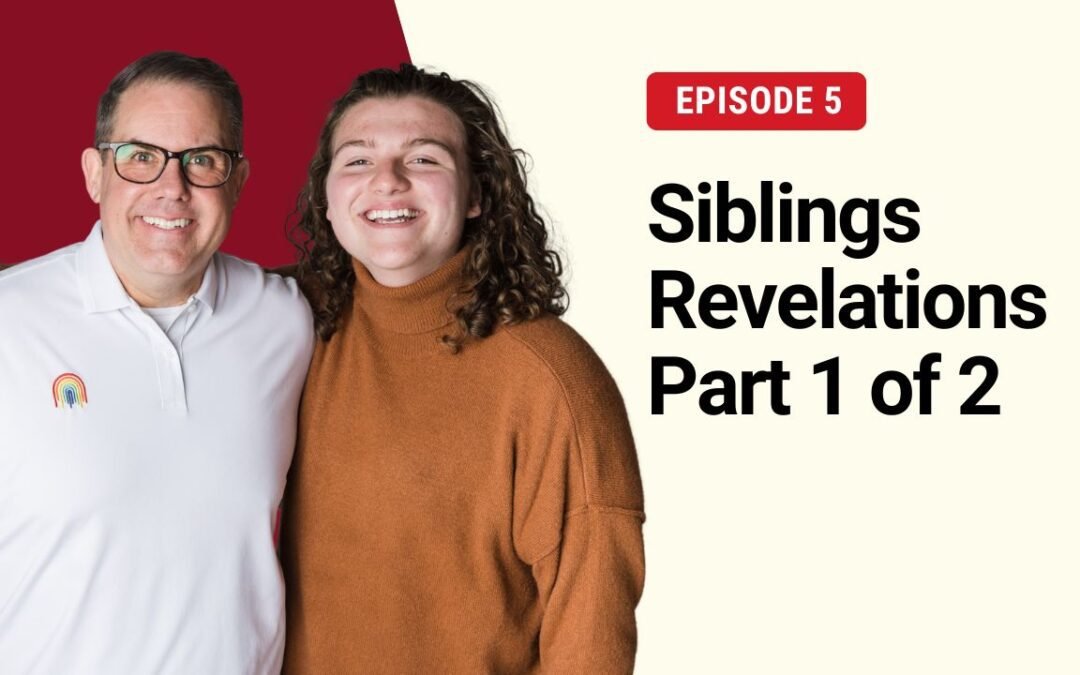
S2E5: Siblings Revelations Part 1 of 2
In this 2-part episode, Chris and Soren are joined by their two younger brothers to discuss the unique experiences and valuable lessons learned from growing up with older queer siblings.
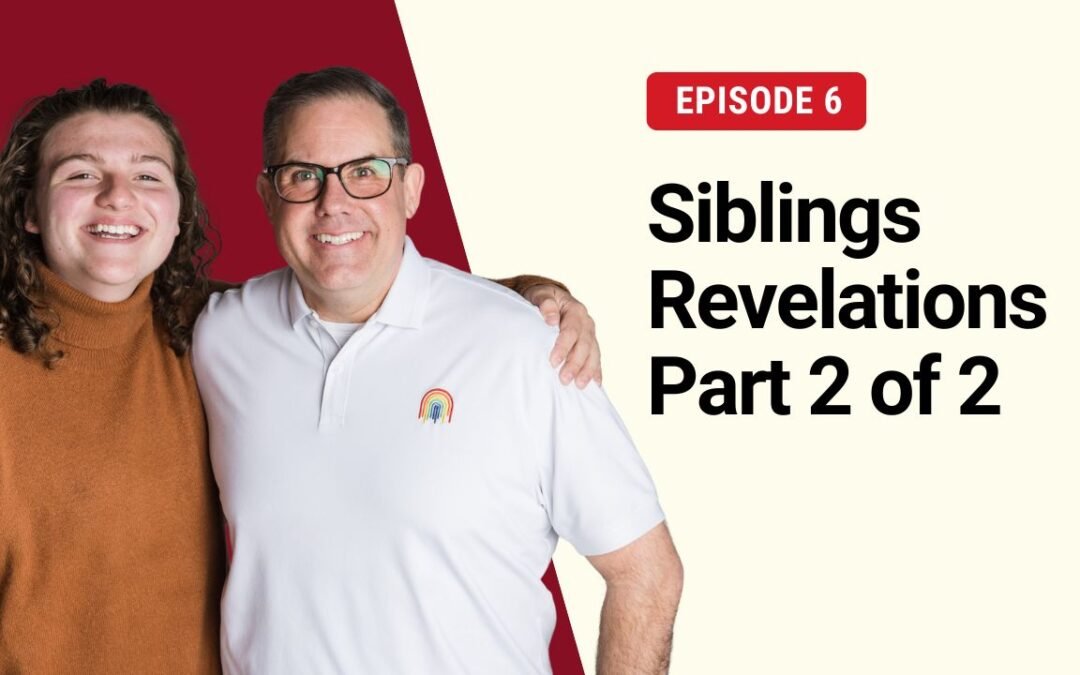
S2E6: Siblings Revelations Part 2 of 2
In this 2-part episode, Chris and Soren are joined by their two younger brothers to discuss the unique experiences and valuable lessons learned from growing up with older queer siblings.
